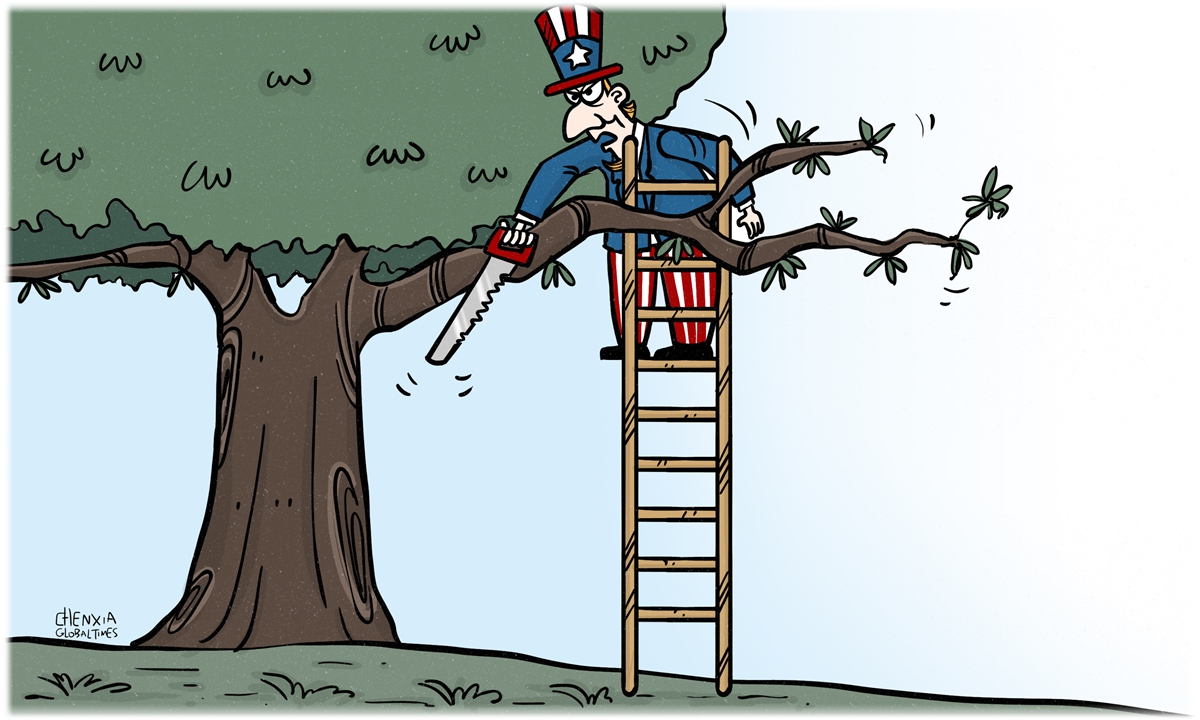
US Illustration: Chen Xia/GT
US Senator Joe Manchin recently stated that he would not support new spending on climate measures or tax increases by the Biden administration, a fatal blow to the bills pushed by the Democratic Party. Common concerns are now mounting if the US will in fact be able to meet the targets it has pledged to the international community to combat climate change.
The US is the dominant player in the current international order and global governance system. However, it has not always been proactive in supplying global public goods. Instead, Washington has gradually changed its attitude toward them in the wake of changes in its strength and the international environment and adjustments to its global cooperation policy. Currently, the US is facing a series of structural problems, and its ability and willingness to lead and coordinate global governance have declined. The country has also become increasingly intolerant of giving other countries "free rides."
The era of globalization calls for more global public goods, as the emergence of issues such as climate change and public health cannot be solved by any one country alone. As a result, the demand for global public goods is growing worldwide.
As two great powers, China and the US should not only safeguard their national interests respectively, but also make efforts to enhance the interests of other countries and play a leading role in international relations. Therefore, both countries have a particular responsibility to provide global public goods.
However, the US has interpreted China's greater willingness, capacity, and actions to provide global public goods from the perspective of strategic competition, and stayed alert to it. It has intentionally sought to restrict China's influence in the world to a limited scope that the US can accept. Washington has also turned global governance issue into an adjunct to its strategic competition with Beijing. This has blocked the supply of true global public goods, such as security and economic development, leading to the following three major problems.
First, while global public goods should be non-competitive in terms of consumption and non-exclusive in terms of benefit, the US has increasingly weaponized the public goods it provides, making them competitive, exclusive, and even confrontational.
For example, economy-wise, the US uses the US dollar, the main global currency reserve, to launch financial wars with hostile countries in its eyes. It has adopted various means to dominate the global semiconductor supply chain, a strategic resource, in the name of national security, utterly abandoning the principles of the so-called free market.
The US has also hoarded a large pile of vaccines at home, pursued vaccine diplomacy abroad, and obtained geopolitical benefits by controlling vaccine distribution. On the issue of climate change, the US has not fulfilled its commitments on emission reduction targets, financial support, and technical assistance. Instead, it has used climate change as a bargaining chip to erect green trade barriers and squeeze the development space of developing countries.
The second is the privatization of global public goods. The original meaning of global public goods refers to goods that can be shared by all members of the international community. According to this definition, the US provides security products such as base troops and military assistance to allies, which are not public goods. Allies "buy" US security services, and what the US gets is their reliance on its hegemony. This product has a strong tendency of exclusivity and privatization, which cannot be shared with the international community and even harms the interests of other countries.
The third is suspicion, rejection and suppression of other public goods. China has always been providing public goods to the international community within its capacity and striving to fulfill its responsibilities as a major power. China has emphasized many times that all countries are welcome to ride on China's development, the global initiatives proposed by China are open to the US, and that China hopes to strengthen coordination and cooperation with the US side to provide more public goods to the world. However, the US is full of contradictions toward China. It not only accuses China of "free-riding," but also excludes China from becoming a provider of global public goods by labeling China as "violating rules."
China has always contributed its solutions to promoting global economic growth, improving the global governance system, safeguarding world peace and stability, and properly resolving regional and international hotspot issues. This is a process for China as a major country to play its responsible role, and it is also a process for China and other countries in the world to enhance understanding and adapt to each other. It is hoped that the US and China can work together to respond to the expectations of the international community.
The author is director and associate research fellow with the Department for American Studies, China Institute of International Studies. opinion@globaltimes.com.cn




